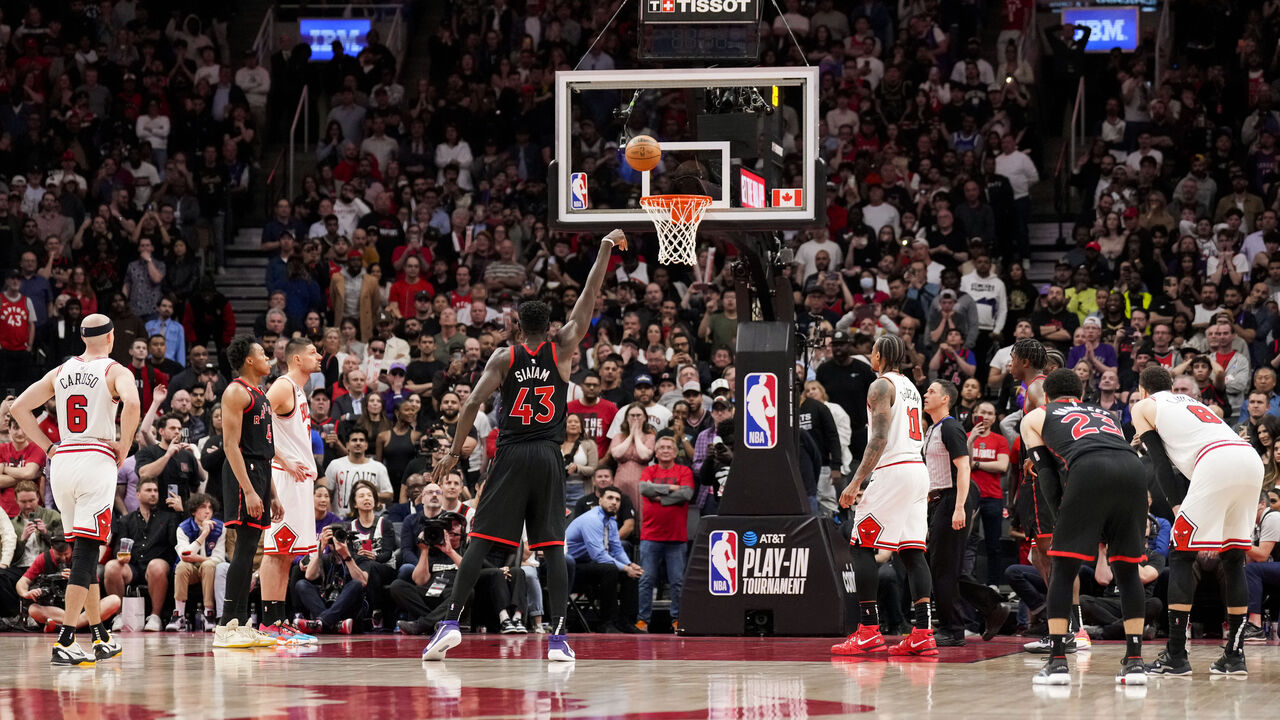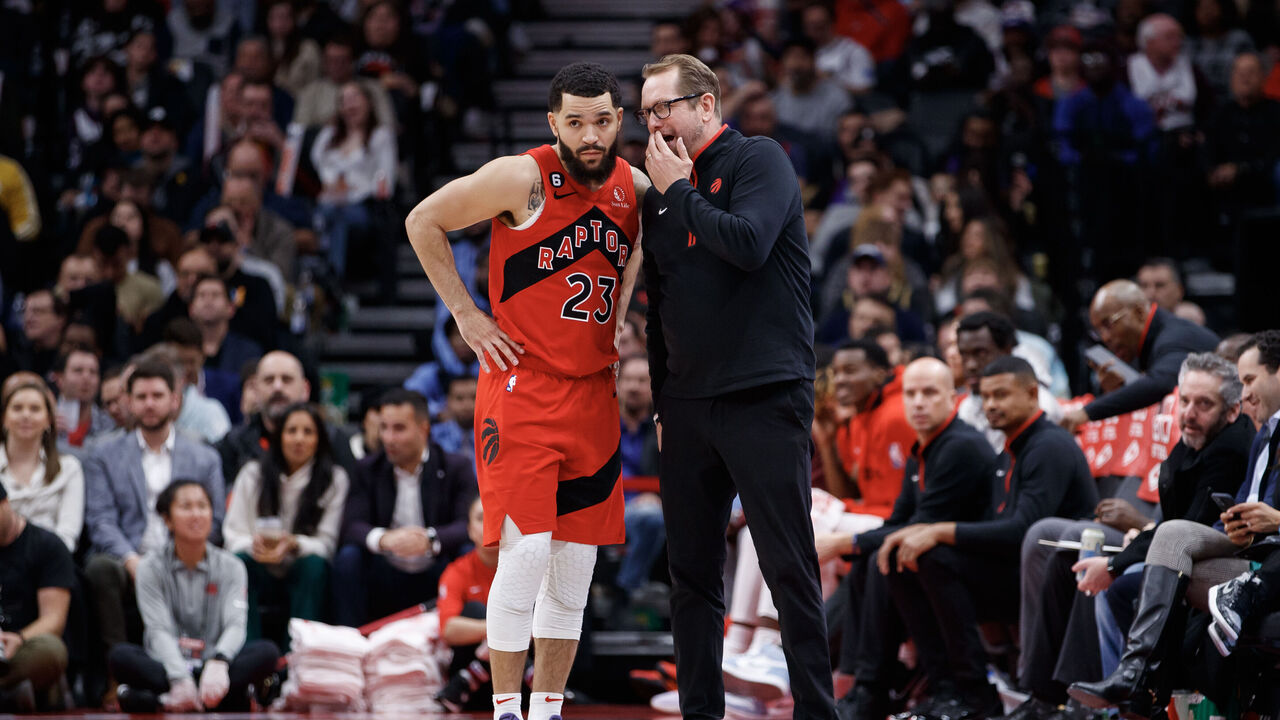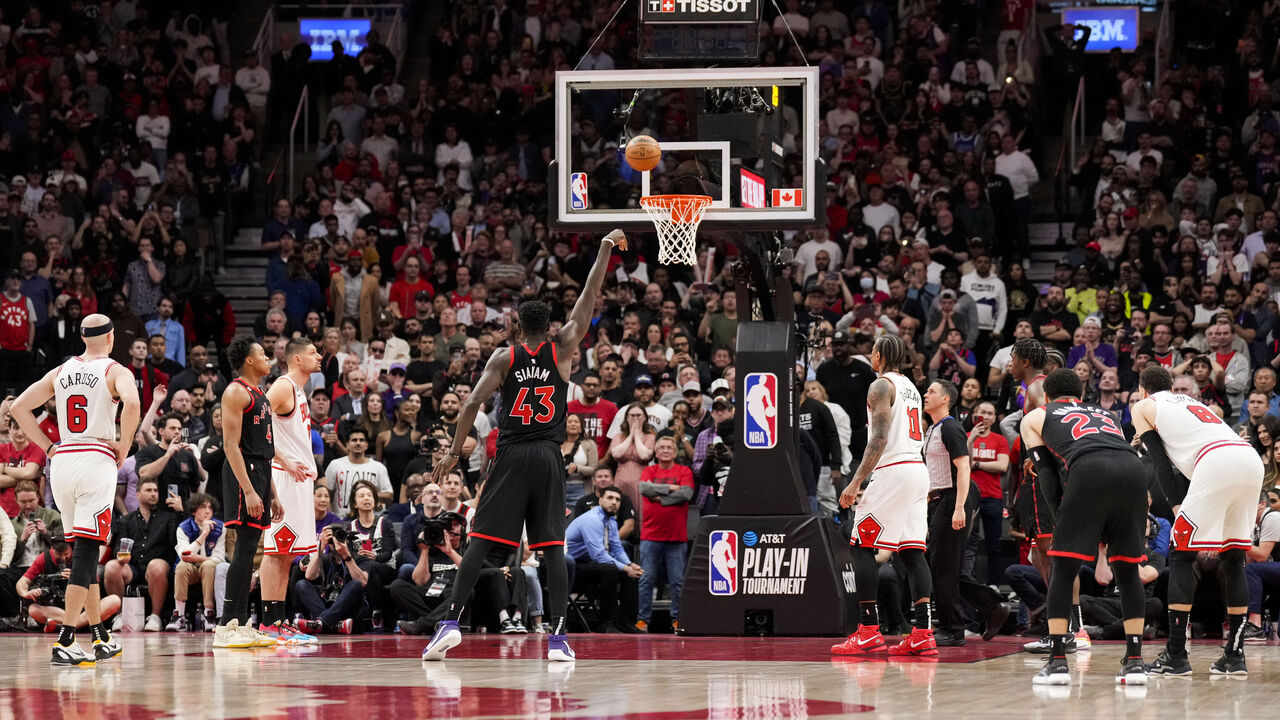The Raptors' vexing season came to a fitting end. Now what?
For a team that spent the entire season inventing new ways to lose, the Toronto Raptors’ 109-105 defeat to the Chicago Bulls in the East’s No. 9 vs. 10 play-in game felt like a fitting end.
The Raptors, who shot 78% from the free-throw line during the regular season (which placed them smack dab in the middle of the pack), missed an incredible 18 of their 36 attempts from the stripe, the second-most misses in a game in the franchise’s 28-year history. That uncharacteristic waywardness may or may not have been influenced by the incessant shrieking of DeMar DeRozan’s 9-year-old daughter, Diar.
In any event, the Raptors watched a 19-point lead evaporate over the game’s final 16 minutes as they clank-clank-clanked away, and Zach LaVine barbecued their perpetually inconsistent defense to a fine crisp. It was the first time in the play-in’s three-year history that a 10-seed emerged victorious (though the Oklahoma City Thunder doubled that tally a few hours later).
It wasn’t the typical manner of shooting drought that’s plagued them so many times this year. There’s no real analysis or sweeping takeaway to pull from such a random occurrence except to say that this is exactly why you don’t want to put yourself in a situation where a single-elimination game decides your postseason fate. Because all kinds of weird things can happen in one game.

The Raptors found themselves in that situation because, at the end of the day, for all their tactical innovation, their unconventional roster construction and play style, their historic possession-battle dominance, and the front office’s stated belief in its outside-the-box vision, this was an aggressively mediocre team. Designing aggressive schemes to neuter opposing stars, forcing heaps of turnovers, and hammering the offensive glass is a nice blueprint in theory, but it doesn’t amount to much when you finish 28th in effective field-goal percentage, 29th in eFG% allowed, and 25th in first-shot half-court offense, per Cleaning the Glass.
Ultimately, beneath the bizarre free-throw shenanigans, the play-in loss still bore all the hallmarks of a 2022-23 Raptors collapse. Their starters performed well, but things went south pretty much any time even one reserve entered the game. With the bench unable to contribute anything, those starters eventually ran out of gas as they trudged well past the 40-minute mark. As things tightened up down the stretch, they struggled to create advantages off the dribble against a switching defense or generate any meaningful downhill pressure. Fred VanVleet was able to get into the paint a lot, but his poor finishing ability and some tunnel-visioned decision-making led to him shooting just 1-for-7 there.
As their laborious offense ground to a halt, they watched helplessly as an opposing guard, who had no trouble creating his own shot in crunch time, rained fire on their heads. They couldn’t contain LaVine at the point of attack (thanks in part to their pressure and high pickup points) and struggled to protect the rim behind that leaky perimeter. After a scorching-hot start from beyond the arc, they missed 10 of their last 11 threes. And Scottie Barnes, the sophomore whose development the Raptors staked so much of this season on, was passive and tentative down the stretch, seemingly unsure of how to assert himself in the offense.
So, yeah, not too far outside the status quo in the grand scheme, even though Toronto played well enough to win. All those little things, not just in this game but throughout the campaign, combined to shrink the Raptors’ margin for error to the point that a screeching child, a team-wide case of the yips from the line, or some combination of the two, could end their season.
“We were a 9-seed, we were .500, so what does that tell you?” VanVleet said after the game. “Win one, lose one. Win two, lose two. That’s just kind of the way it went. There were a lot of different things going on, a lot of noise, different things coming from all different angles. I’m proud of the group for sticking together. We didn’t really have too much negativity inside the locker room.”
It’s not hard to suss out what VanVleet was referring to when he mentioned the noise surrounding the team. The Raptors were ultimately victims of their own improbable 2021-22 success, and their inability to build on or even sustain that success made them feel like a bigger disappointment than they actually were, considering how their roster stacked up against the rest of the East. But that perceived disappointment, along with the impending free agency of multiple key rotation players, led to a monsoon of rumors around the trade deadline, with every name save Barnes bandied about at some point as a candidate to move.
We don’t need to rehash that deadline, at which the Raptors swerved with a win-now trade for Jakob Poeltl, another free-agent-to-be. Poeltl’s arrival did improve the team significantly and helped lock its identity in place. The Raptors outscored opponents by 8.7 points per 100 possessions with him on the floor. But that still wasn’t enough to lift them to a play-in victory, which would’ve only assured them a crack at the Miami Heat on the road in a bid for the 8-seed, which itself would’ve only granted them the honor of being the Milwaukee Bucks’ first-round roadkill.
Now Poeltl’s free agency, along with VanVleet’s and Gary Trent’s, is just another jagged piece of a complex offseason puzzle. The VanVleet situation feels particularly challenging, given how important he is to the team but how badly he struggled with his jump shot and point-of-attack defense at various points this season. That puzzle also includes potential extension talks for OG Anunoby (who the Raptors kept at the deadline rather than trading in exchange for packages that reportedly included three first-round picks) and Pascal Siakam, both of whom can opt out of their current deals after next season.
And, oh yeah, Nick Nurse tossed a grenade into the trench during the final week of the regular season by openly discussing his plans to reassess his coaching future with the team in the offseason. So there’s that.

All of which is to say, it’s shaping up to be a transformational summer in Toronto, though we’ve seen these come and go before without president Masai Ujiri and general manager Bobby Webster doing much beyond retaining their own free agents and making some tweaks at the back end of the rotation.
They wouldn’t necessarily be wrong to go that route again, at least in the short term. The writing appears to be on the wall regarding the partnership with Nurse, so they’ll likely have a huge decision to make on that front. In terms of the roster, though, they’ve kind of painted themselves into a corner where they have no choice but to try and re-sign their guys (at least VanVleet and Poeltl) and figure the rest out from there. Trent is heading into free agency on the heels of perhaps his worst game as a Raptor, which could turn the team off of him or bring his market down far enough that re-signing him becomes appealing. Going the sign-and-trade route is always an option, too.
On the bright side, there’s another lottery pick coming the Raptors’ way (the silver lining of this embarrassing defeat), and there’s still the potential of Barnes and Precious Achiuwa for them to dream about (even if a lot of the shine came off those guys this season). There’s still an All-Star playmaking forward in Siakam at the center of everything and a perennial All-Defensive candidate in Anunoby on the wing. There’s also a decent sample to suggest that this whole thing works reasonably well with Poeltl in the middle. It’s not the worst place to be.
It’s not particularly exciting, either. When Ujiri took the top job in Toronto’s front office back in 2013, he insisted the team wouldn’t be caught in the middle. A few years, several 50-plus-win seasons, and a championship later, he turned his nose up at the idea of chasing a play-in spot, with the Raptors instead maneuvering for lottery position in the draft that netted them Barnes.
We should be wary of using those words against Ujiri. Building a contending team is exceptionally hard, and he shouldn’t be castigated for trying and failing to do so in the wake of losing Kawhi Leonard for nothing – especially since two of the Raptors’ four seasons since that departure have been smashing successes. But that philosophy is hard to square with Toronto’s deadline-day decisions this year and certainly makes one wonder how or if the front office will change direction this summer.
If the goal is to continue trying to compete in the present, then the Raptors clearly need to significantly deepen their backcourt and add more shooting and off-the-dribble creation. If that isn’t feasible, it might be time to consider a full-scale rebuild. It doesn’t feel like another “culture reset” will suffice this time.


